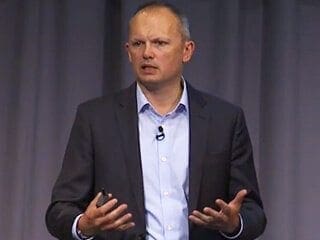Jon Worren kicks off the 10th season of Entrepreneurship 101
September 29, 2014

Don’t have an idea? You don’t have to go too far to find and validate one. In our first Entrepreneurship 101 lecture “Finding and Validating Your Idea,” speaker Jon Worren shared advice from his own experience as an entrepreneur.
At the heart of his lecture was the process of finding new insights and understanding the processes around validating your idea’s value to the market. Jon also shared more broadly about entrepreneurship by recommending that we understand the risks and the impact of starting a business.
Find new insights
“I try not to read stuff that I’m educated in…. I’m trying to get new insights…different perspectives.”
- Read (in general)
- Watch TED talks: They provide high-level, well-presented content that is not only educational but also entertaining
- Read market research/statistics: This tells you a story of change, which can then be used to make educated guesses about market trends and white spaces. Jon also said that market research provides context, “If we don’t have context for what we do, it’s hard to come up with good ideas.”
- Meet smart people: Jon said this has been the best way for him to come up with good ideas. Make use of group and networking opportunities such as Entrepreneurship 101.
Entrepreneurs go about life differently; they see problems differently and are motivated by problem solving. Another great way to find an idea is to keep your eyes open to the problems and challenges around you, and to give yourself room to think about how that problem can be solved.
Once you’ve gained some insight, Jon recommends giving your brain time to slow down so that the idea can “meander” or “percolate.” From a neurological perspective, crudely speaking, slowing down allows for greater communication between the left and right brain (the logic centre versus the creative centre). However, Jon said, “not everything should be a business”—keep this in mind as you follow the process of validating your idea to make sure there is demand for it.
Validating your idea
Here at MaRS, we often refer entrepreneurs to the lean method of starting a business. This is a quick and low-resource way to go about validating your business idea:
- Know that your business idea is based on many assumptions. Identify what those assumptions are
- Test those assumptions in the market. Ask “Are people willing to pay for my solution or product?”
- Measure the feedback you’re getting in order to prove or disprove your assumptions
- Based on the feedback you’ve received, stop, more forward or iterate
If the idea doesn’t work, that’s fine. Jon shared from his own experience in this regard, and said, “If you know how to get one idea, you’ll know how to get a better idea the next time around.” This process is a great way to remove the risk from your business idea, which is important to do before you try to grow, find financing and scale.
Understand the risks and impact
There are four different types of risk to starting a venture:
- Technical: Does your idea solve the problem?
- Financial: Can you access financing?
- Demand: Are there customers who are willing to pay for your solution?
- Execution: Do you have the skills, ability and organizational structure to implement the plan?
Before you start your business, also think about the impact of entrepreneurship on your life: consider the impact on your family, your capacity for financial investment and your end game (that is, what do you want to do if it actually works?). Entrepreneurship has many benefits, but it also involves many risks. If you start out right, you increase your chances of success.
For more insights, check out the video from Jon’s lecture.
Produced by MaRS.
Register for Entrepreneurship 101: The next lecture is on Wednesday, October 1, 2014.
Resources:
- Video: Finding and Validating Your Idea
- Video: Lived it Lecture with Dan Martell
- Video: Lived it Lecture with Brant Cooper
- Article: Being an entrepreneur
- Blog: Four lessons that changed Dan Martell’s entrepreneurial beliefs
- Innovation: Kotler on marketing
Want to connect?
- Join the Entrepreneurship 101 LinkedIn Group.
- Follow the conversation on Twitter: #ent101.
- Get updates on Vimeo.
- Download the course schedule.
- Download the course syllabus.